Virtual Skoll World Forum 2020: Collective Strength
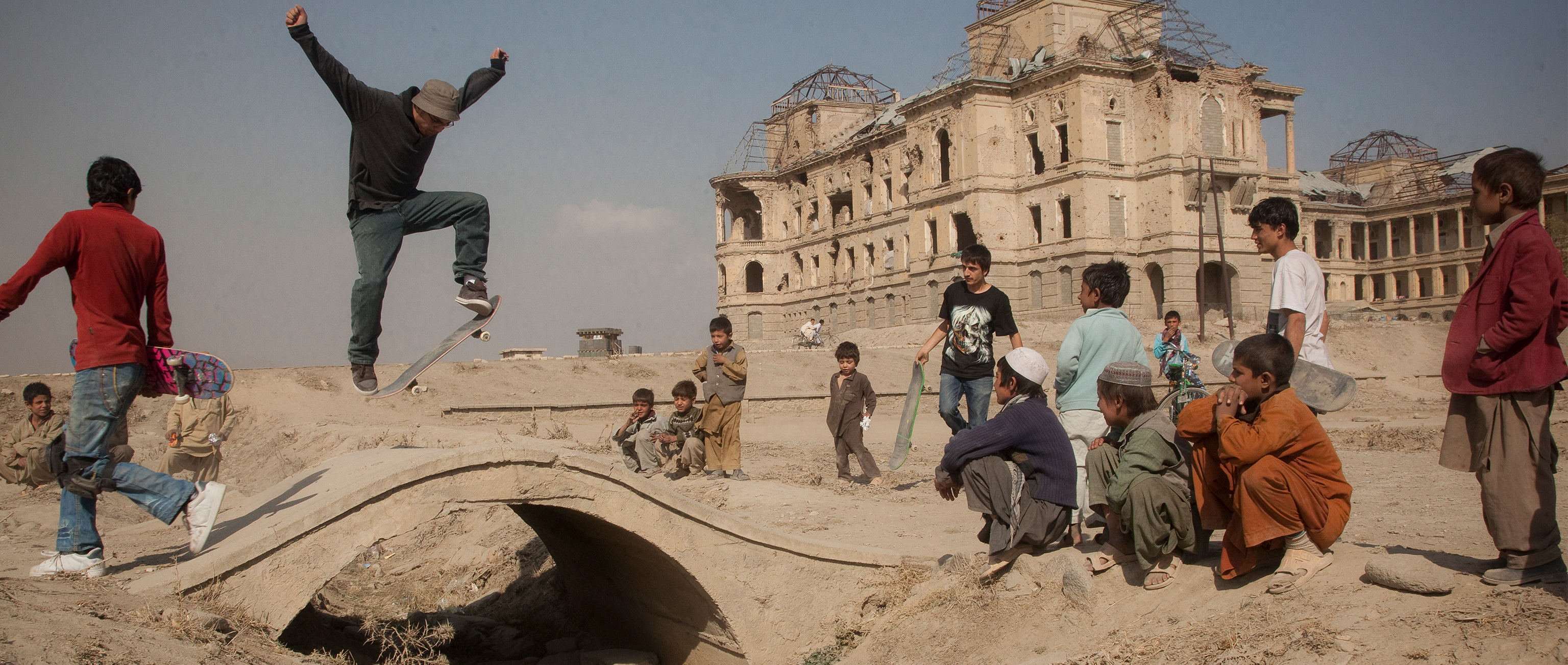
It’s spring 2020 and, like much of the world, skateboarders are on lockdown. Around the world, there are over 200 social skateboarding projects, each aiming to empower young people and build community through skateboarding. But as Covid-19 wreaks havoc, the skaters are off the streets. Instead, they are connecting through a webinar series, hosted by Skateistan’s Goodpush Alliance. Coming together to share ideas as to how they can continue to reach their beneficiaries, skate projects in many different locations and contexts are working out how to navigate through the pandemic. ‘Coping with Covid’ was the first of this webinar series, just one of the ways that the Goodpush Alliance is supporting the growth of social skateboarding, built on the ideas of collaboration and sharing the knowledge that Skateistan has built up since its inception in 2008.
“Over the years, so many other social skate projects had asked us for help,” said Oliver Percovich, Skateistan Founder. “We started to think about a way that we could lift up the whole sector, instead of keeping what we’d learned to ourselves.”
Twelve years ago, in a disused fountain in Kabul, an Australian man started teaching children how to skateboard. He noticed that their common love of skateboarding could be a powerful tool in bringing children together from diverse backgrounds. In 2020, that same man attended the Academy Awards ceremony in Hollywood, where Learning to Skateboard in a Warzone (if you’re a girl) took home the Oscar for Best Short Documentary. It’s been a long journey for Skateistan, the NGO which was founded by Oliver Percovich in Kabul in 2008.
“I was a researcher with a degree in chemistry,” Oliver said. “I’d done a load of jobs, but I didn’t know how to run an NGO. We learned as we went, and that inevitably meant that sometimes we learned the hard way. We made a lot of mistakes.”
Skateistan was the first NGO to combine skateboarding and creative education. It remains the largest international skate NGO (according to a recent global survey of social skateboarding projects), being the only one with an annual budget of over $1million. As well as reaching over 13,000 students since its inception, Skateistan has expanded, both within and outside of Afghanistan. It now runs Skate Schools in Kabul, Mazar-e-Sharif, Phnom Penh, and Johannesburg. Construction is underway on a fifth Skate School in Bamyan, Central Afghanistan.
In 2017, the NGO decided to launch a new program called The Goodpush Alliance. The idea was to provide resources and support for the whole social skateboarding sector, which has over 200 organizations. Most initiatives using skateboarding for social change have very limited resources and time. 75 percent of social skate projects have budgets of less than $50,000, and only 31 percent have paid full-time staff members. Given the grassroots nature of this emerging sector of Sport for Development, social skateboarding projects often struggle to achieve sustainability or provide regular training to their staff and volunteers.
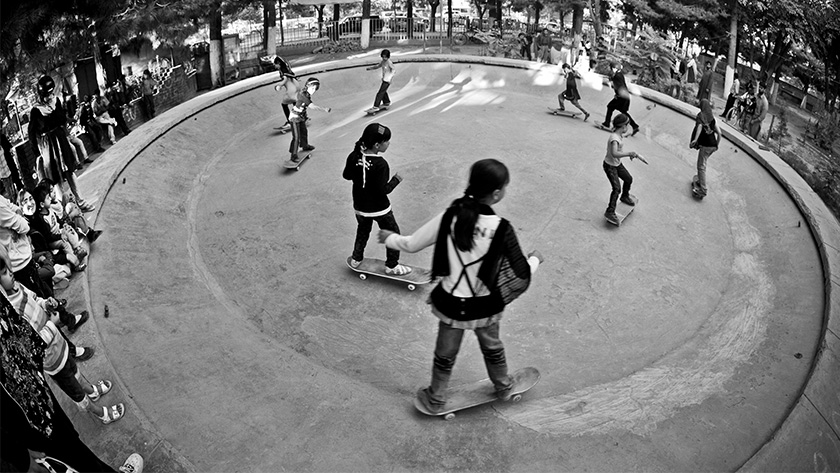
Skateistan had been looking for a way to scale its impact globally. Rather than seeking to replicate its own model, which would be expensive, labor-intensive and time-consuming, it began work on a project that could reach tens of thousands of children and young people each year, by providing support for other organizations with shared and similar aims.
“We saw no reason to keep Skateistan’s ‘secret sauce’ to ourselves,” said Oliver. “We wanted a way to really scale our impact, but Skateistan’s method is actually quite deep and narrow. It’s a relatively intensive way of working with children over a number of years. We thought that by helping other organizations that were already doing good things, we’d be able to share the knowledge we had accumulated and scale our impact by supporting the whole sector.”
At the end of 2017, the organization won the WeWork Creator “Scale” Award for its Goodpush idea—providing much needed funds over three years to launch this sector-wide support program. Rhianon Bader, who started working for Skateistan as a volunteer in Afghanistan in 2010, and had held various roles in the organization since, was appointed Program Manager for Goodpush, which officially launched its pilot phase in 2018.
This pilot saw Goodpush select three partner organizations, to whom it would provide tailored support, in the form of a small support grant, workshops, online support and in-person visits; Rhianon and Skateistan Programs Director, Talia Kaufman, visited the partner sites, and all partners went to Skateistan Cambodia to observe Skateistan programming and to share their own insights and experiences.
“From the very beginning, Goodpush was about sharing knowledge in all directions, rather than Skateistan telling other organizations how to do things,” said Rhianon. “The social skate sector is full of different models that suit various contexts – the idea of selecting partners was so we could all learn from each other and that pooled knowledge could then be shared with the whole sector.”
That knowledge, from both Skateistan’s experience and the collective knowledge of the sector, forms what is now the Goodpush Toolkit, an open-source, online set of resources which anyone can use to help guide a social skateboarding project. From advice on how to get started, all the way through to promoting inclusion and establishing a child protection policy, the toolkit is designed to support social skate projects, whatever their stage of development.
Goodpush also provides a community forum, where projects can connect directly with each other, as well as hosts events (both online and in-person) where organizations can learn from one another.
With these digital resources Goodpush can continue benefiting organizations currently working to empower children through skateboarding, and those in the future. The online toolkit enables more social skate projects to spring up, empowered by the collective knowledge of Skateistan and the Goodpush community. The experience that Skateistan has acquired in 12 years of operation can now benefit over 10,000 children and young people per year, instead of 2,500 (the direct beneficiaries of Skateistan’s programs).
One of those first Goodpush partners was 7Hills Skatepark, a skateboarding project set up in central Amman, Jordan in 2014. The public skatepark construction was a collaborative, crowdfunded project between Philadelphia Skateboards, Make Life Skate Life, and the local and global skateboarding community. Once built, 7Hills started to run skateboarding sessions there for young people.
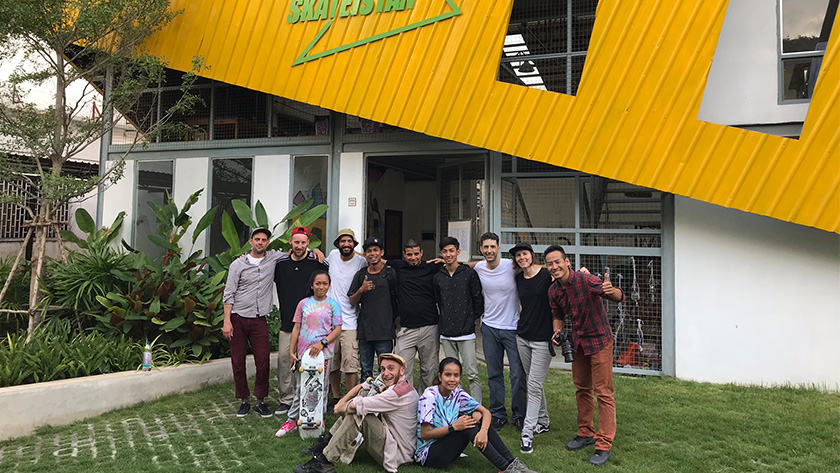
The project has a focus on integration, providing opportunities for local and refugee youth alike, as well as girls-only sessions. Jordan has the second highest number of refugees in the world, with large numbers from Syria, Iraq, Palestine, Sudan, and Somalia in particular. 70 percent of 7Hills beneficiaries come from the refugee community. Their Leadership program helps young people from both Jordanian and refugee backgrounds earn skateboards. They do this by helping young newcomers to the park and developing leadership skills, which contribute to better integration and equality within the community and sustainability of the skate program.
The park is also an important public space in Amman and 7Hills promotes the development of inclusive public spaces for youth through skateboarding.Parents and families often picnic around the skatepark while the students skate and the space also has a basketball court, which 7Hills built in response to community need. Programs are focused on leadership, skateboarding, arts, and photography.
As part of their Goodpush partnership, Mohammed Zakaria (Director) and Kas Wauters (Programs Director) went to Cambodia in 2018 to visit Skateistan in Phnom Penh, alongside Palestine-based SkateQilya, which was also a Goodpush partner in 2018.
“These workshops helped us to transition from a skate project into a NGO which uses skateboarding to create impact,” said Mohammed. “Before this, we were skaters who were running a skate program. Now we’re an organization and we think about what donors need, what the long-term impact could be.”
Kas focuses on the sharing aspect of the opportunity. “SkateQilya was another Goodpush partner and it was great to share ideas with them – they’re closer geographically to us so it was good to get their insight as well,” he said. “The whole week was focused around totally open discussion and sharing of insights between all three organizations.”
While in Cambodia, Goodpush partners had the chance to observe a skate session for children with disabilities in Phnom Penh.
“Seeing the skate class for kids with disabilities and going to the deaf school were real highlights,” said Kas. “It showed us what could be possible for our community. The energy in that skate class is just incredible – it’s just the purity of skating – not about tricks, just about joy.”
As a result of the partnership, 7Hills has been able to secure new funding, establish a log frame for the outputs and impact of their project, as well as improving their child protection policy.
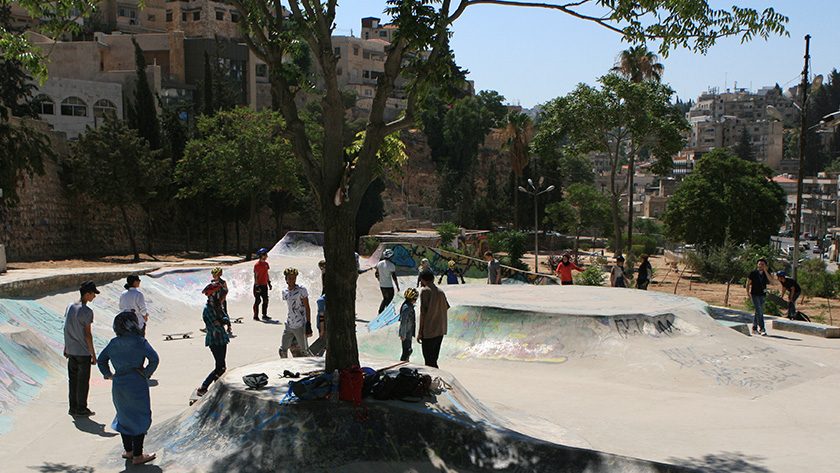
More recently, Goodpush has been hosting webinars to help support the sector through the Covid-19 pandemic as almost all skateboarding projects have had to suspend programs.
The relationship between Goodpush and partners is long-term. Kas has attended the Covid-19 webinars and found them useful.
“The global skate scene is connected because skaters seek out these kinds of projects, but what Goodpush does is to organize this and to co-ordinate so that we can come together in a meaningful way,” said Kas. “There are so many people attending the webinars—we know that everyone is having the same challenges and that we’re all willing and able to share ideas as to how to face this.”
Several years after the two organizations first connected, the two-way relationship continues. For some time now, Skateistan has been interested in setting up a skate school in Jordan, and 7Hills has supported them in this mission. Soon 7Hills will start acting as an implementing partner in Jordan, running Skateistan’s Skate and Create program through their own staff and youth leaders. They have also supported Skateistan with a needs-assessment in-country and with the process of registering as an NGO and navigating the Jordanian official landscape. On the programs side, Skateistan has learned a huge amount from 7Hills’ strength in working with the refugee community.
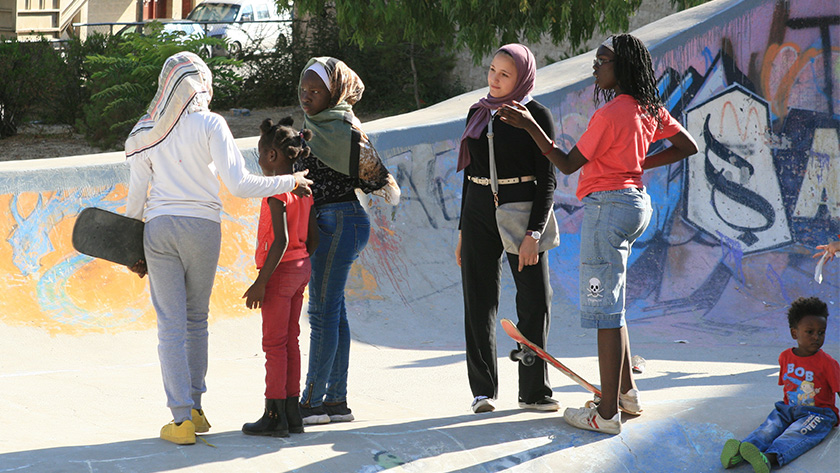
“Supporting refugees is something that Skateistan is really keen to be involved with, but not something we have much experience of,” said Rhianon. “7Hills has been and will remain key to our understanding of how to engage effectively with refugee communities as well as prioritizing integration through our programs. What we’ve been able to build through partnership is much more than the sum of its parts. We’re all able to run our programs more effectively and to reach more vulnerable young people because of what we can learn from each other.”
By 2025 the Goodpush Alliance plans to support 500 member organizations, which will provide safer, more inclusive skateboarding and educational programs for an estimated 20,000 children. The planned expansion of Skateistan’s own programs to more continents (currently in Asia and Africa) will strengthen the Goodpush community by providing regional hubs for further learning and collaboration.
This collaborative model comes very naturally to skateboarders, who, even in competitions, support one another and celebrate the success of others. This mutually-beneficial model is the kind of effective partnership between NGOs that can work towards achieving the Sustainable Development Goals.
Want more stories of transformational change on the world’s most pressing problems? Sign up for Skoll Foundation’s monthly newsletter.
Notifications